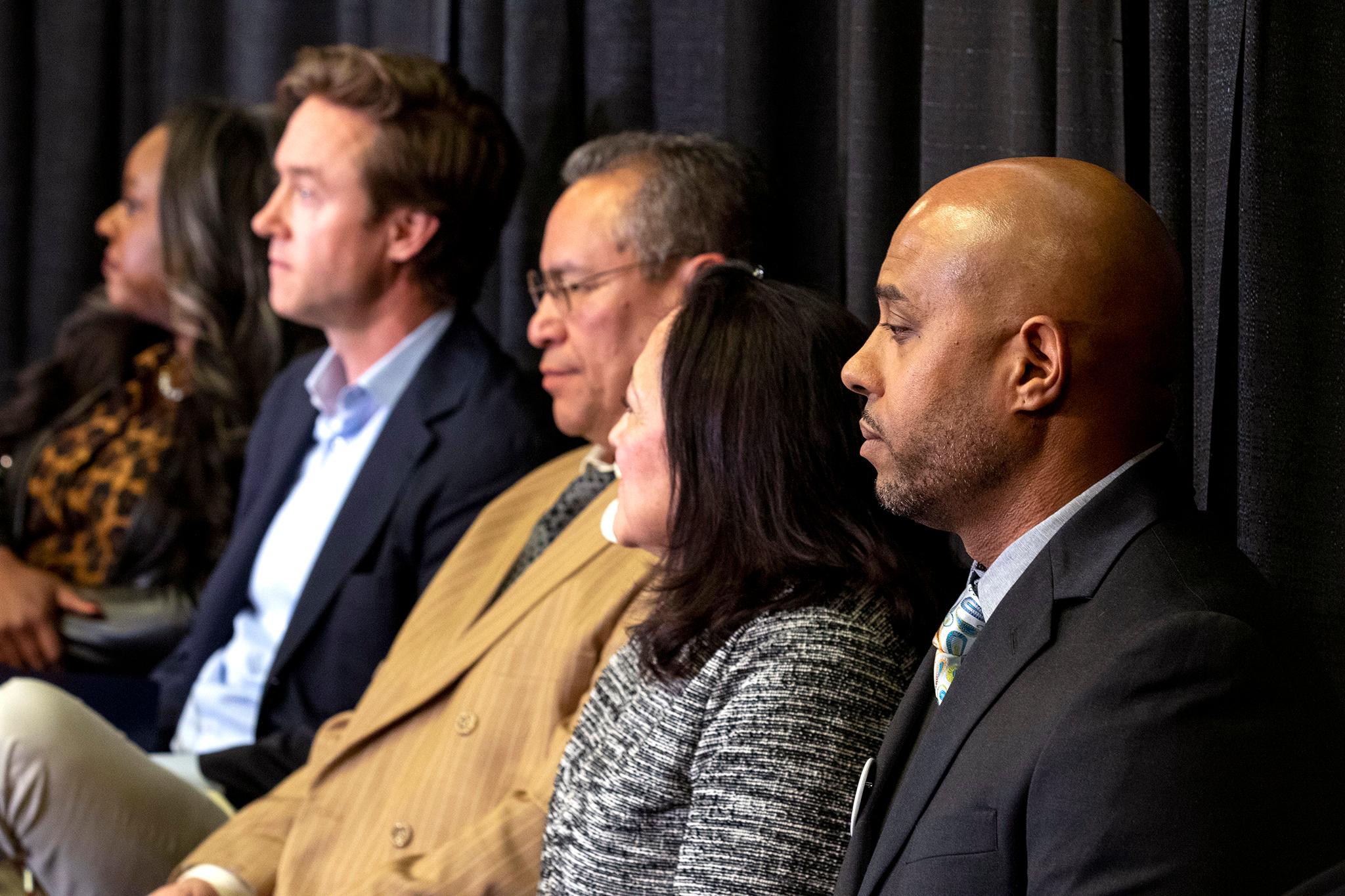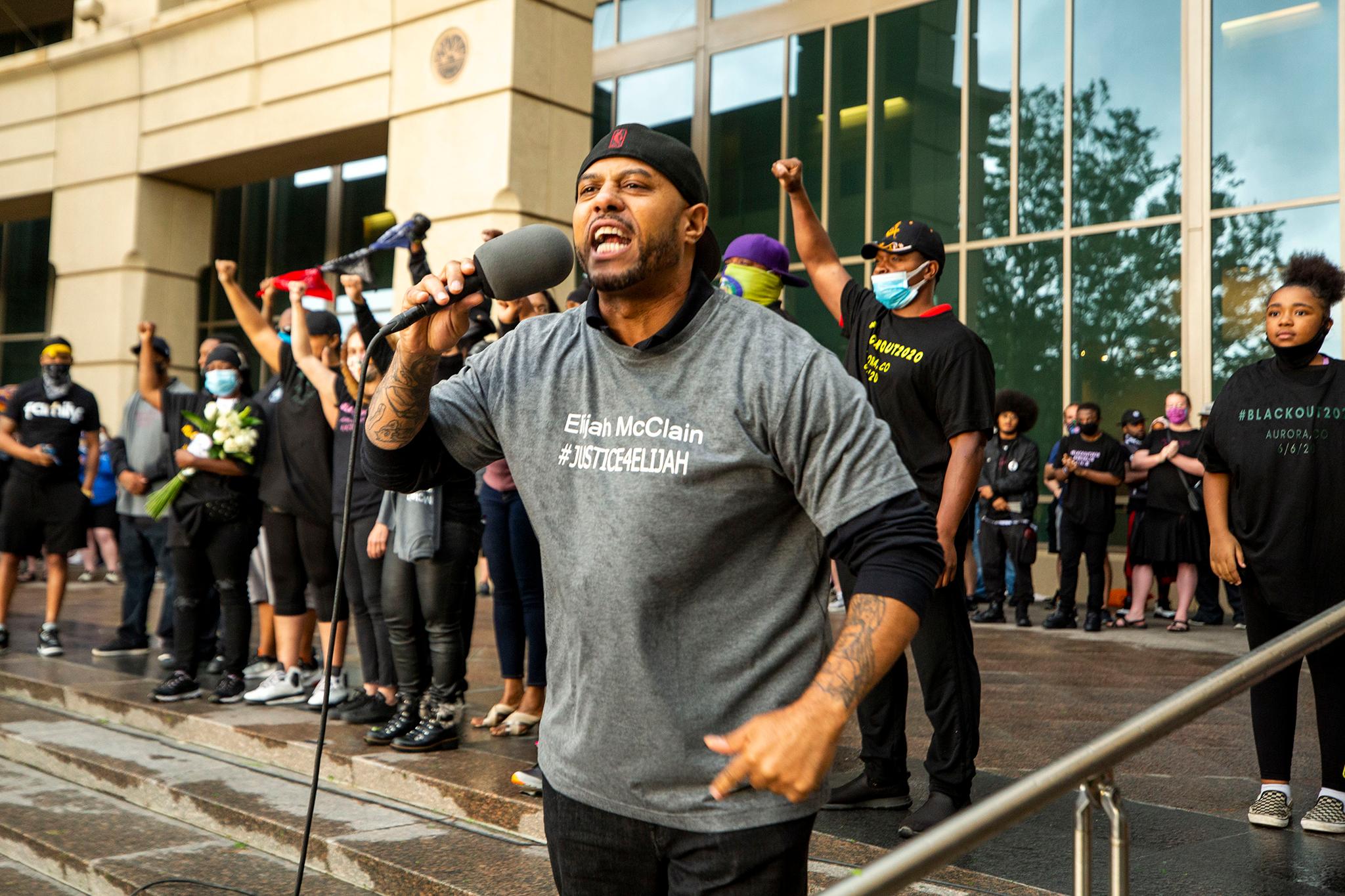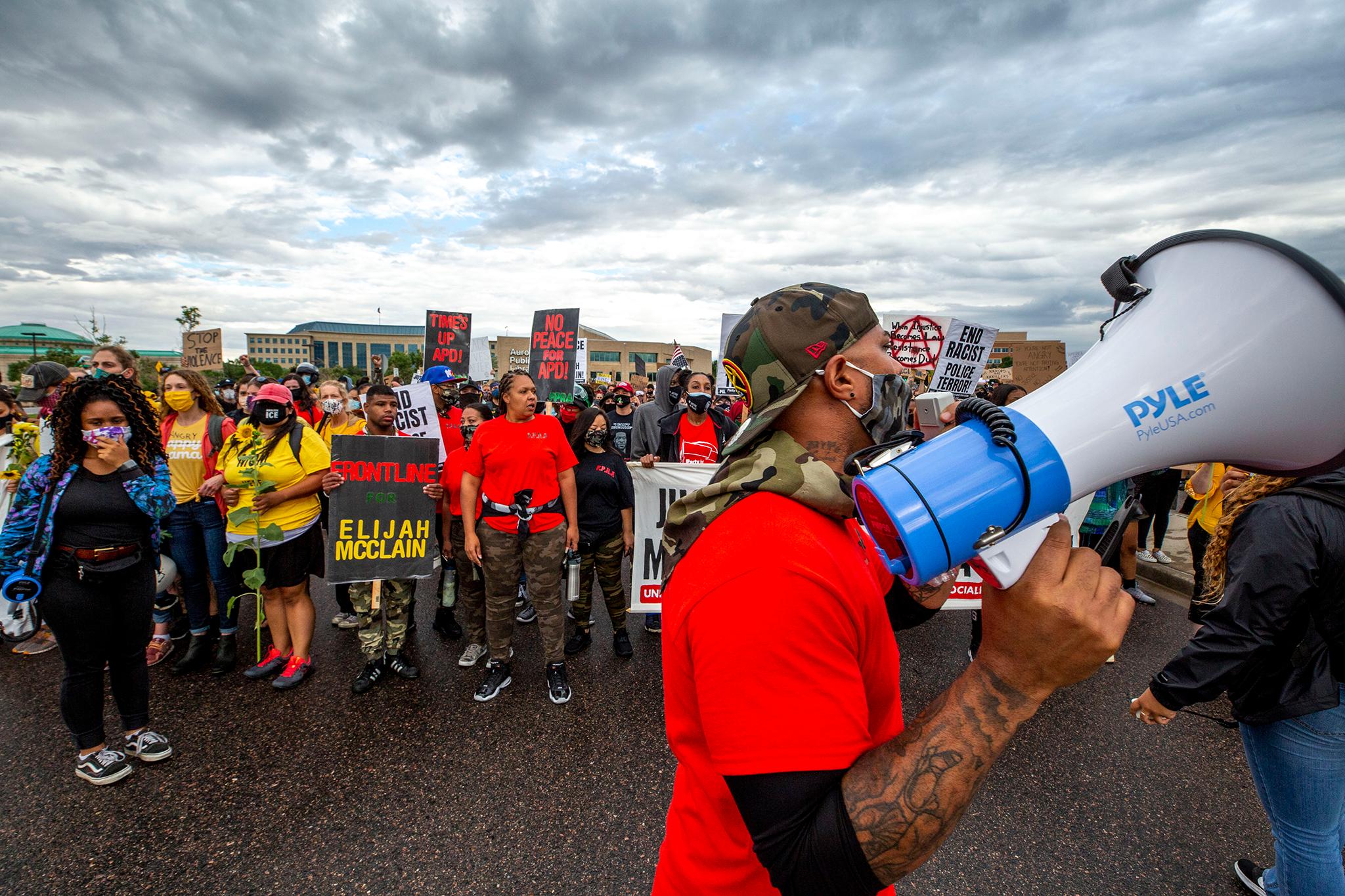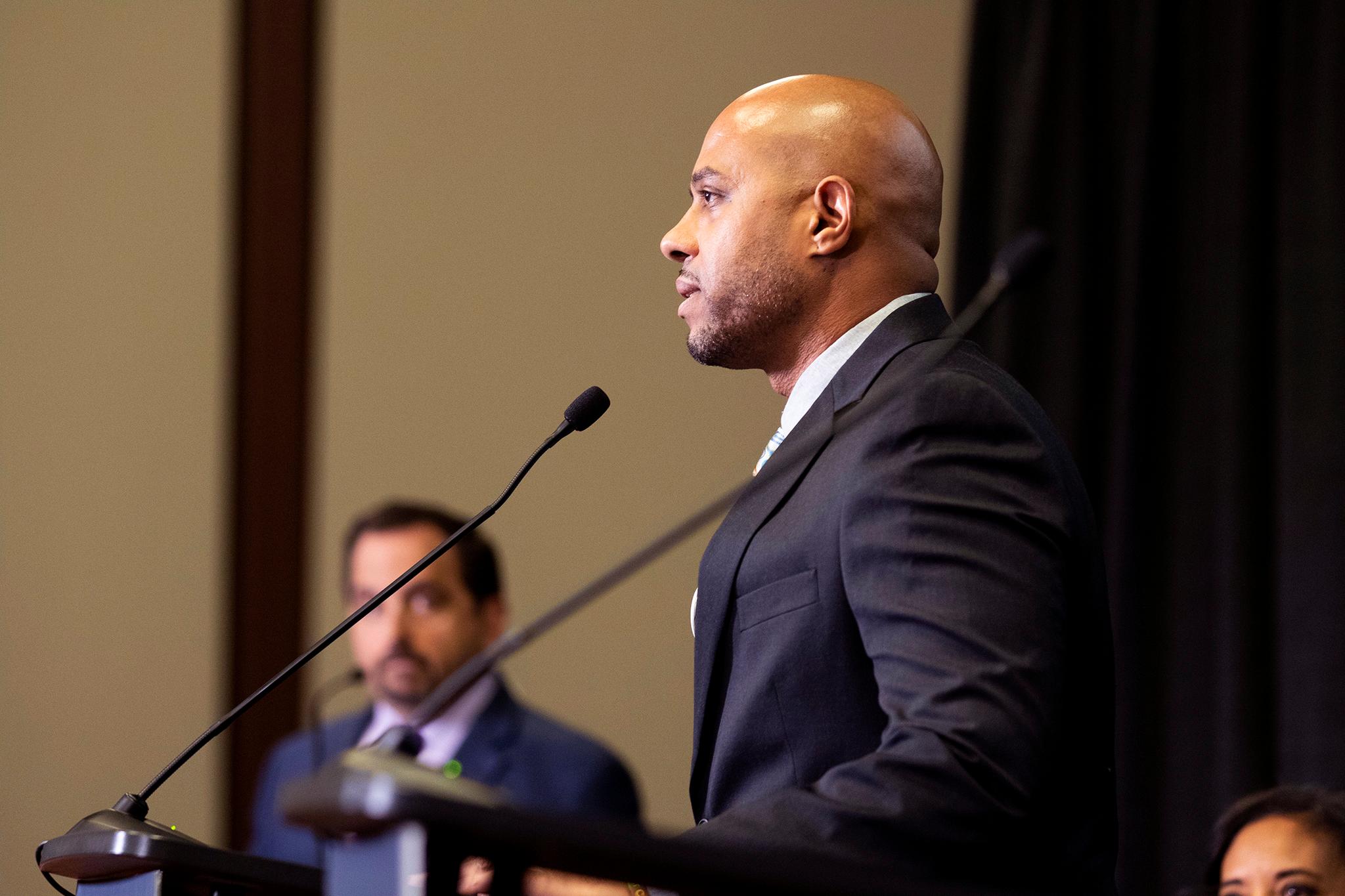What's cooler than a red or blue bandana? Terrance Roberts asked over a cup of chai at the Dazbog Coffee in Capitol Hill.
"This neon green beanie is cooler," he said, pointing to the Terrance Roberts for Mayor gear he's been air-brushing and handing out as part of his campaign to be the most powerful elected official in the State of Colorado.
Roberts believes he has a good chance at becoming mayor -- but he has obstacles ahead of him.
Fundraising has been a struggle for him. Roberts is a Fair Elections Fund candidate, meaning he's receiving a 9-1 match in taxpayer dollars for qualifying donations. He's currently in 11th place with $83,108.24, an eighth of what Kelly Brough, the candidate with the biggest coffer, has raised.
And while other candidates deal with monied competitors and their wealthy backers, the former Blood has dealt with death threats on social media from Blood-affiliated men.
He's likely the only former gang member to be running for office in the country. He's the only candidate who has described being shot as a qualifying experience. And while hasn't talked about it on debate stages, he's likely the only mayoral candidate to have shot somebody.
So why run for mayor with a personal history that may give some voters pause?
He wants the city to be affordable for everybody. He wants crime to drop. He wants the air to be cleaner.
Roberts is troubled by the rampant gentrification of Five Points, he said, and the pollution in Elyria-Swansea and Globeville.
He wants each neighborhood to have a say in zoning and does not believe there's a one-size-fits-all solution when it comes to density.
"There's African American groups that are saying, well, we don't want to live in apartments anymore," Roberts said. "We're ready to transition into an affordable, single-family structure, which are not affordable right now."
Instead of incentivizing developer-built, income-restricted housing, as Mayor Michael Hancock's administration has done, the city should build government-owned-and-operated social housing, he said.
"If this administration would have been focused on not only just affordable housing but also adding public housing for the last 11 or 12 years, we wouldn't be in such a housing crunch," Roberts said. "There will be more housing availability, cheaper housing prices."
He would fund the social housing, built by community land trusts, through a public bank. Cities like Los Angeles and Chicago have explored this model, as have states like New York and Washington. North Dakota has a state public banking system.
In a city where permitting is sluggish and projects take years to complete, Roberts believes the city could build enough housing "in a matter of weeks." He also plans to use eminent domain to acquire unused buildings and turn them into housing.
He also wants to incentivize the film industry to do more production here.
And if Roberts has his way, he will cut the mayor's term from three to two. The position is too powerful, he said.

He plans to reduce crime by creating youth centers filled with arts programming to keep young people from joining gangs and invest more money in the arts citywide.
Denver should become a 24-hour city and do away with mandatory bar closing times, he argues, because it would decrease the concentration of crime after bars close.
Denver contracts with active gang members to fight gang violence, he said, and he would reverse that decision. Creating social housing will alleviate all manner of crime, from domestic violence and homicides to car theft, drug dealing and beyond, he believes.
"We're not going to defund the police when I'm the mayor," he said. "I'm the one saying that we are averaging way too many homicides. We are going to do a public safety audit. If the police are hoarding money that they don't need for certain programs that are not helping our murder rate, we will be transferring that money. I'm not going to defund the police where we're losing officers. We actually need to make sure we hire better officers, more trained officers."
He also plans to expand the Support Team Assisted Response program that sends social workers and medical personnel to emergency calls that do not require an armed response.
Roberts says his experience as a gang member and a person who has been shot makes him uniquely qualified to address Denver's crime problems.
As a youth, he climbed the ranks of the Bloods in Northeast Park Hill. He was a feared gang member known as Showbiz, a persona his father, George Roberts, described as "a demon" to author, filmmaker and investigative reporter Julian Rubinstein, in his documentary "The Holly."
Rubinstein has faced similar threats on his life over "The Holly," and he has entered Colorado's address protection program.
As a young man, Terrance Roberts spent nearly 10 years in and out of prison, where he read extensively and eventually quit the gang.
After getting out of prison, Roberts formed a nonprofit, Prodigal Son. He set up shop doing anti-gang activism in the Holly, a shopping center and community hub for the neighborhood -- also Bloods territory.
"At first, they laughed at me," he recalled. "They were like, 'Oh, Terrance is a nerd now. Look at Showbiz. Ha ha ha.'"

Roberts took to wearing camouflage to represent his youth program Prodigal Son and his anti-gang organizing. Through that organization, he worked to rebuild the Holly after Crips torched the shopping center in 2008. He built basketball courts on the site and even worked with the Urban Land Conservancy and the billionaire Anschutz family to bring a Boys and Girls Club to the neighborhood.
"My family, we threw a family dinner because the Rocky Mountain News called me an activist," Roberts said. "Because you have to earn that title. They don't just call you an activist. No one gets to just get called an activist."
Community organizing earned Roberts national acclaim and press as a prominent anti-violence activist. He shared an office with then-State Sen. Mike Johnston, one of his fellow candidates running for mayor this year.

Roberts' activist career was temporarily derailed after he held a community unity rally where he shot a young man he had mentored. The man, Hasan Jones, was a Blood, Roberts said, and had joined a mob of Bloods who had been threatening Roberts.
A felon who was barred from owning a gun, Roberts was arrested and charged with attempted homicide, assault with a deadly weapon and other crimes.
He won his case in 2015 on the grounds of self-defense. That he was a felon in possession of a firearm was incidental, the court decided.
For a few years, he was largely quiet. He pursued rapping under the moniker T Rob Tha Realest.
And eventually, he established himself as a major voice in the George Floyd and Elijah McClain protests and sued the City of Aurora after being pepper-sprayed by officers.
He worked on criminal justice reforms at the Statehouse, including collaborating on the drafting of Senate Bill 217, which mandated local law enforcement officers wear body cameras.
Despite the not-so-conventional road to politics, Roberts is optimistic he will win.
"We're a tough team to beat," he said. "And this neon green is very visible."












